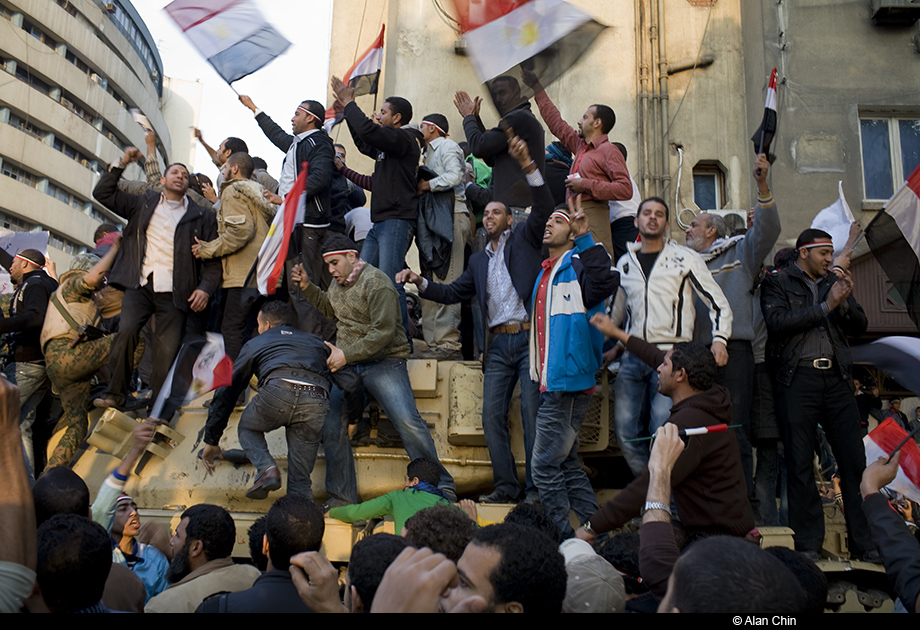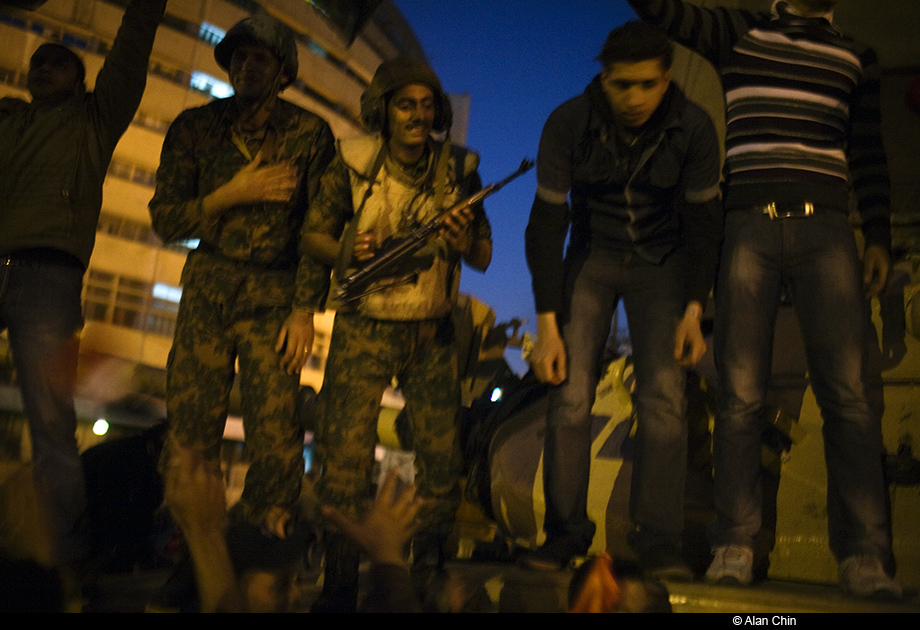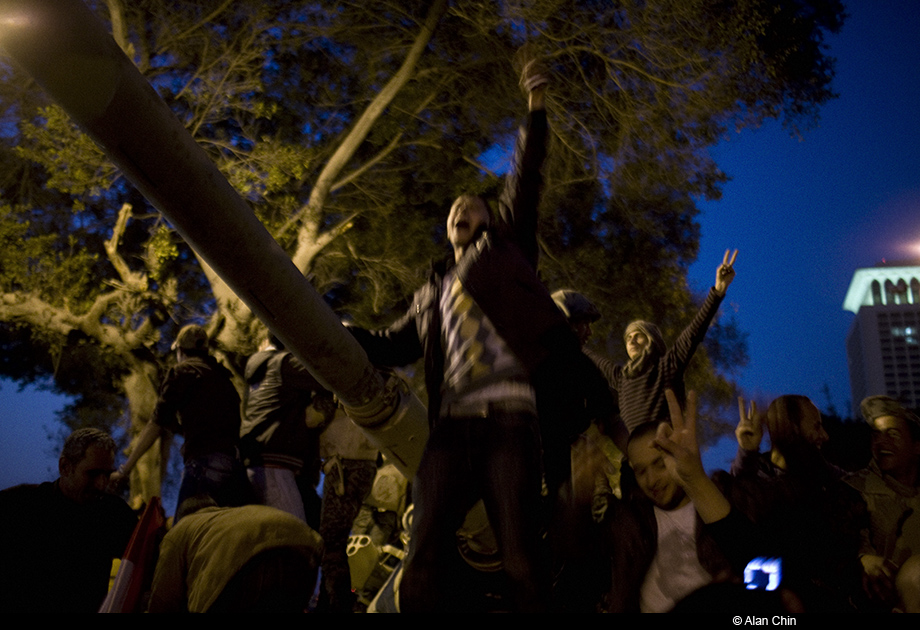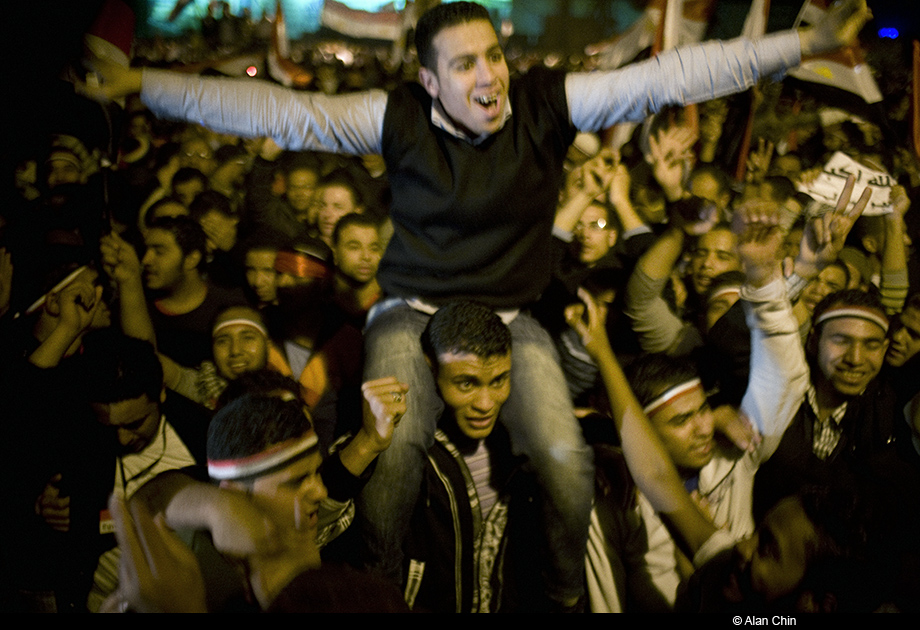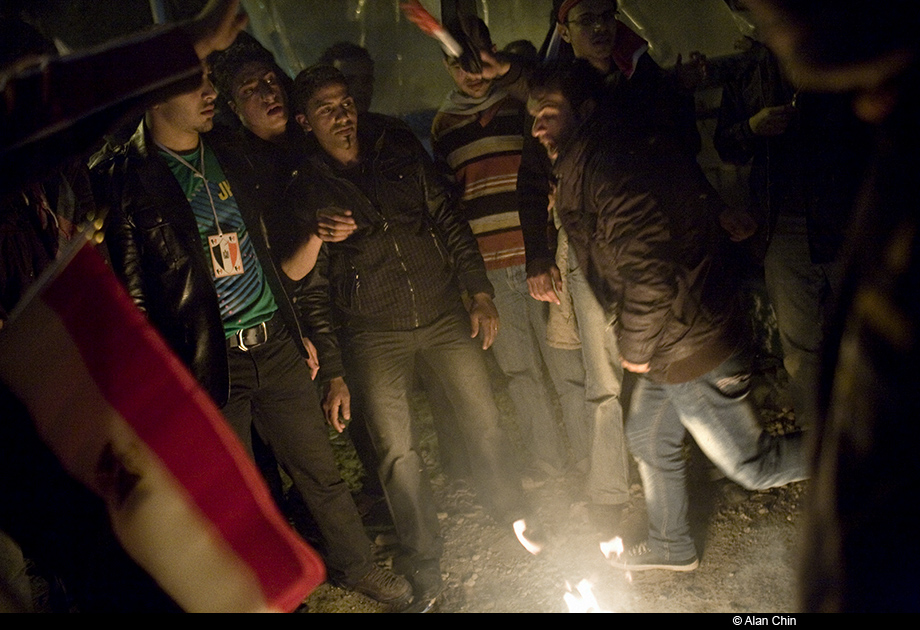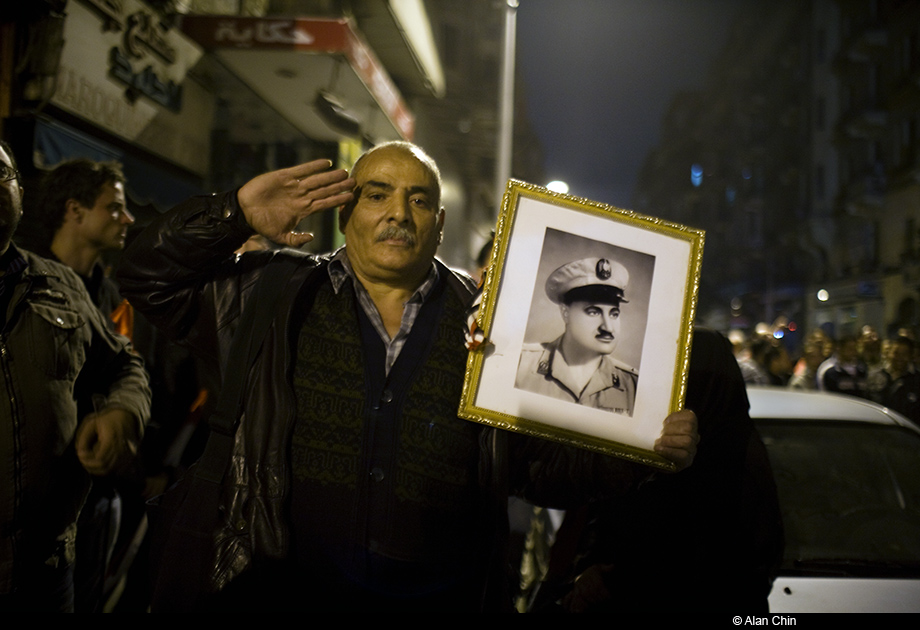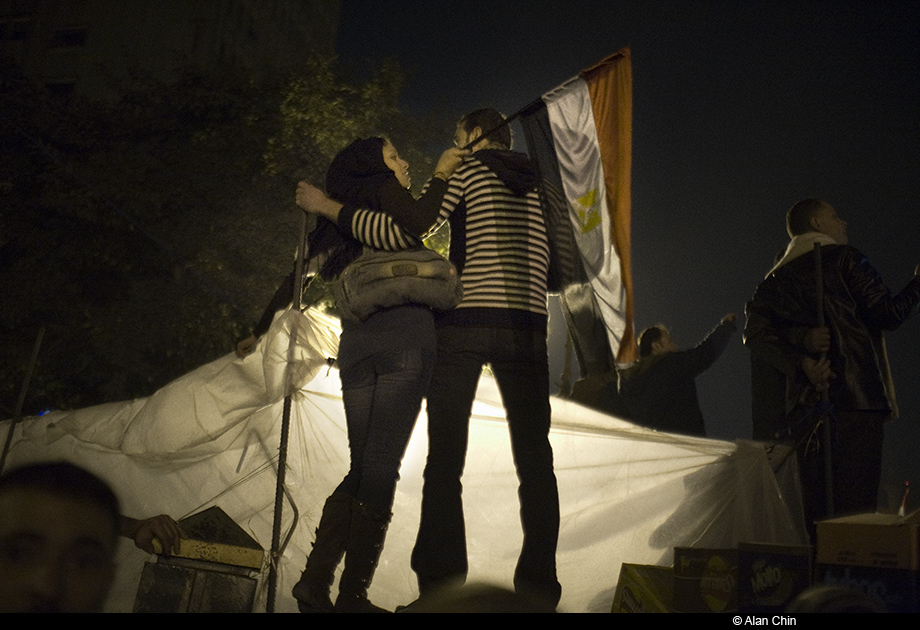Interview With Mona Sief - Activist, Blogger, Student

Getty Images
Tweeting from Egypt's Tahrir Square
February 04, 2011
Amid the chaos in Egypt this week, protesters kept the Twittersphere buzzing with first-hand information about what was happening on the ground. Among the vigorous tweeters was Mona Seif, an activist, blogger and post-graduate student at Cairo University. She spoke to OTM from Tahrir Square, where she says the mood was hopeful.
[MUSIC UP AND UNDER]
BROOKE GLADSTONE: From WNYC in New York, this is On the Media. I'm Brooke Gladstone.
BOB GARFIELD: And I'm Bob Garfield. During the chaos in Tahrir Square in Cairo, we managed to get in touch with one of the protestors who was tweeting vigorously from the ground. Mona Seif is an activist and post-graduate student in cancer research at Cairo University. She joined us Thursday night from the Square.
MONA SEIF: Today they were trying different ways of weakening us and undermining us. They harassed any protestors trying to join us or to bring us food or medical supplies. They also cracked down on most of our legal support. They have arrested them. One of them is my dad. We do not know where they are right now. Despite all of this, the spirit is still good, the numbers are still great.
BOB GARFIELD: I'm interested in your journey to get to where you are now in Tahrir Square, and I'm particularly interested to know how much Twitter and Facebook, SMS played a part.
MONA SEIF: All the social networks played an extremely important role. The, the choice of the day was, because the 25th of January the state decided two years ago to name it Police Day, where we celebrate all the great things the police do to us – and, of course, our police [BOB LAUGHS] are completely corrupted. So the call was to take that date and really show our rage at the corruption of the state. And the ongoing joke on the Internet then was how you cannot set an event on Facebook saying, okay, prepare yourself, revolution is next week. But –
[BOB LAUGHS]
- apparently, you can. [LAUGHS]
BOB GARFIELD: [LAUGHS] So, so you can - you can run a revolution like a birthday party.
MONA SEIF: It turns out that, yes. I’m not sure if any country could do that but, apparently, in Egypt you can set it up, an event on
Facebook -
[BOB LAUGHS]
- and it becomes serious. [LAUGHS]
BOB GARFIELD: At an early stage, the government realized what was happening on social networks and just cut off Internet communication entirely. How were the groups able to mobilize and carry out their plans in the absence of this kind of social communication?
MONA SEIF: That’s the point where the government, I think, made a misjudgment. The, the social networks played a great role to, to call for the 25th of January. When it became apparent that it is no longer just a small protest and that it is becoming bigger and bigger than what we had expected, it became really actually a movement. It was going to go on no matter what are the available methods of communication.
By chance, one of our friends still had Internet connection. She was so scared to admit it because she didn't want to get it shut down. She had her wireless provided by one small company, which had all the stuff on financial exchanges, so the governments were not ready to shut down this -
BOB GARFIELD: Mm-hmm -
MONA SEIF: - particular company yet. So she turned her place into our technological hub. Basically, we were more than 25 people there. We all go to join the different protests going around Cairo, get as much footage as we can, run back to her place. We all set up our laptops, sent out all this material outside to, to newspapers and TV channels and then get back to the street to get more footage, and so on.
BOB GARFIELD: [LAUGHS] It’s like you – it’s like somehow using a government tank to get behind enemy lines.
MONA SEIF: [LAUGHS]
BOB GARFIELD: It’s a funny Trojan horse -
MONA SEIF: Yes, yes. [LAUGHS]
BOB GARFIELD: - provided to you by the government.
MONA SEIF: Yes, yes. We really were trying to make sure that some leakage of info would get out, and then it’s up to the virtual world on the Internet to help it prep. Landlines were not shut down at all, so in case we don't have any access to Internet we can call our international correspondents and tell them the updates of the protests.
We also had a friend hidden away with one satellite device just in case every other [LAUGHS] method of communication were shut down. And we sent out his number to a couple of contacts, so they call him and get any updates from him, and we call him on landlines to give him the updates.
BOB GARFIELD: When the government shut off the Internet, did it have a backlash of infuriating people who otherwise would not have mobilized?
MONA SEIF: I think it had a backlash, but not because of infuriating people. A lot of the people who would have normally been satisfied with just following the updates on Facebook and Twitter suddenly did not have this connection, and so they found no way of being part of this movement, except by going out on the street.
So I actually think that cutting off the Internet helped the movement in the - on the real ground and in the street become bigger.
BOB GARFIELD: We get a lot of criticism here in the West about Twitter. Would you - like to take this opportunity to explain to skeptics what Twitter can mean?
MONA SEIF: Yeah. I understand this criticism because I've been getting it a lot from my friends. And I think sometimes it needs an experience like the one we are just in to really grasp how powerful such a tool like Twitter is.
The use of Twitter in engaging different people in bits of your life is really what makes it a powerful tool when there is a serious event and you want to engage people, because if it’s only used as a newsfeed, then it would be boring and it wouldn't be as interactive as it should be.
Usually I use Twitter for really personal things, so I just share moments from my work or moments from my love life or I talk about my cats or my family. And it engages lots of different people, so when these people are following you and suddenly you are talking about a torture case, some of them might not usually be exposed to such cases. But because they are following me and there is an ongoing conversation between us, they would suddenly be engaged in this, as well. So it’s a really powerful tool, in that sense.
BOB GARFIELD: The movement has coalesced a number of forces of, of anger at the regime. There are trade unionists, there are Muslim Brotherhood elements, there are young people who have been facing hopelessness and despair and unemployment. How worried are you that what comes next may be worse than the status quo, for example, an Islamic revolution?
MONA SEIF: I really am not worried. And I know this might sound strange for a lot of people, but what I have seen during the last nine days is making me really hopeful.
I am in Tahrir Square with thousands of people from completely different backgrounds, and for once in my life all of the big issues that we are usually encountering in the streets of Egypt and having to deal with, like violence and tension and secular problems and sexual harassment against girls, and all of these issues that we keep on talking about, they do not exist.
I am in Tahrir Square feeling that I belong with those people, and they are everyone. There are Muslim Brotherhood, there are independent people who do not belong to any party. I really, really think that this could come up with a much, much better scenario than what all of the outside world is expecting or fearing.
BOB GARFIELD: Inshallah.
MONA SEIF: Inshallah. [LAUGHS]
BOB GARFIELD: Mona Seif spoke to us from Tahrir Square in downtown Cairo.
>via: http://www.onthemedia.org/transcripts/2011/02/04/01
__________________________
February 11, 2011
Alan Chin from Cairo:
Mubarak No More!!!
On the phone this evening, Alan said this historic day really needs few words. As closely as BagNews has been following the sequence of events, however, these first three photos bear some description. As Chin narrates:
“I positioned myself at the TV station where a large crowd was protesting all day. In my mind, I was remembering Moscow ‘91. I wasn’t there but a very good friend, a photographer, was shot in the siege at the station. There was talk that Egypt’s Republican Guard was protecting this broadcast center, though I couldn’t be sure of that.
“At one point, the crowd actually climbed on top of the tanks and the soldiers were trying to get them off. Tension was high and it felt like things could spin out of control. But the soliders removed them politely, which was a clear sign that there wasn’t going to be any incident. It was rather remarkable, actually, given the rage from the night before. Anger, anger, anger, polite, polite, polite. The soldiers asked them nicely and people got off. Then suddenly, everybody started started screaming. Mubarak had stepped down!!
The third photo above, I’m sure you recognize, is the same tank, the protesters celebrating with the soldier. And in the fourth, the jubilation takes hold.”
So, here are the rest with just minor notes…
Up till now, small fires in Tahrir were for warmth. Tonight, along with the fireworks these are flames of celebration.
This man, perhaps a former military officer, gives a salute holding a portrait of Nasser. Says Chin: “The resurgence of nationalism.”
Photographer David Degner said that parents generally don’t like their children going to Tahrir because kids go there to flirt. He added, though, that since the uprising started, people have been far too serious for that.
Appears the love is back!

Saturday, 12 Feb 2011
Today, the people were more resolved than ever to get rid of Hosny Mubarak, especially after last night's provocative statement. I went to the presidential palaces alongside thousands of Egyptians and we surrounded it completely. Within a couple of hours we received the news: MUBARAK HAD ABDICATED!
Now, mind you, he didn't really abdicate..the army overthrew him. That's why we only had Omar Suleiman letting us know this. But it doesn't matter. We will get all the money they stole and use it to rebuild the country.
Tonight will be the first night where I go to bed and don't have to worry about state security hunting me down, or about government goons sent to kidnap me; or about government sponsored hackers attacking my website. Tonight, for the first time ever, I feel free…and it is awesome! ![]()
Save any and all disagreements with any of the groups that operate them. We will disagree with each other, and that will be sweet because no more dictatorship. Tomorrow we squabble,and…tonite?
TONIGHT WE CELEBRATE! ![]()
FUCK OFF MUBARAK..I HOPE YOU BURN IN HELL! ![]()
__________________________

'the sound of freedom' (in Egypt)
Sout Al Horeya صوت الحريه Amir Eid - Hany Adel - Hawary On Guitar & Sherif On Keyboards
A solidarity protest song titled Sout al Horeya, 'the sound of freedom', by Moustafa Fahmy, Mohamed Khalifa, and Mohamed Shaker.
"I went down and I said I am not coming back, and I wrote on every street wall that I am not coming back."All barriers have been broken down, our weapon was our dream, and the future is crystal clear to us, we have been waiting for a long time, we are still searching for our place, we keep searching for a place we belong too, in every corner in our country."The sound of freedom is calling, in every street corner in our country, the sound of freedom is calling.."We will re-write history, if you are one of us, join us and don't stop us from fulfilling our dream.

Wyclef Jean - "Freedom" (Song For Egypt)

